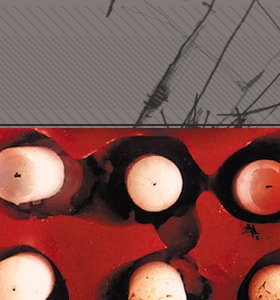Carew: How long ago did you actually record the album, and how long did you have to sit there waiting for it to be released?
Williams: I was ready to record the album by the summer of '99. I recorded the album in January of 2000. The album came out in Europe January of 2001. The album came out in the United States October of 2001.
Carew: So how did you spend all that downtime?
Williams: Well, from the time the album came out in Europe we were fine, because we were touring in Europe the entire time. That was fine. Aside from that, I spent a great deal of time touring colleges, doing poetry readings at universities, and teaching poetry workshops. And I spent a great deal of time depressed!
Carew: What does "touring" entail? What kind of band were you going around with? What other people were you traveling with?
Williams: I put a band together before I actually got signed. The band consists of viola, cello, electric guitar, bass, drums, and DJ. The reason why I signed with Rick Rubin was because I discovered before that that the music I was leaning towards had a "rock" edge to it, and so I thought, "I think Rick might know how to handle this thing." And so that's what I've toured with.
Carew: Have you found that your words are magnified when you're performing in front of a live band, or do they almost kind of regress into the music to become part of a whole?
Williams: It's a bit of both. It's a bit of both. Because with every amazing word, there's an amazing sound that can heighten it, y'know? And sometimes the sounds are more important than the words themselves. And sometimes it's the intensity that is felt, and the spirit that is felt. Because, y'know, even if I was standing in front of an audience reciting poetry, a lot of the things that I'm saying can be so abstract that it can go over people's heads. So there might as well be music to drown it out [laughs], because it goes over my own head half the time. It's very, uh, connected to a bunch of just crazy sources that it sounds like it's just connected to a crazy stream of consciousness that you have to piece together at your own pace. So, there are times when I think that the music heightens the poetry, yet at the same time I know it's not the same thing as having the words without the sounds.
Carew: Do you feel like a rock star out front of that big band playing loud behind you?
Williams: Well, let me explain. The name of the album is Amethyst Rock Star because amethyst is my birthstone; I'm born in the month of February. And, chemically and biologically we are all made up of the same exact things that stars are made of. We have the same properties inside of us.
Many of those properties I feel, though, are intuitively connected to our spirits. Like how you may find a woman who's pregnant or a person who's in love and say "Wow, you're glowing!" So we have to tune into that energy in order to take on the characteristics of the properties that we have within us.
We are all naturally stars by birth, so my first response to your question is I don't need to stand on stage with a band in order to have that feeling. None of us do. And that is why the album is titled that. It is to say that when you tune into your spirit, you don't need the spotlight. Rakim said it best in his rhyme that he wrote in, I guess, '88. He said, "That's one thing I don't need is a spotlight, because I already got light."
Carew: So, do you feel a bit alone, in terms of the "contemporary musical community," so to speak, in making the kind of music that you are making, and making music with a really positive, spiritual core?
Williams: No! Not at all! I look at OutKast, I look at Common, I look at The Roots, I look at Mos Def, I look at Radiohead, I look at Björk, I look at System of a Down, I look at Jill Scott, Erykah Badu, India.Arie, Fiona Apple, Alanis Morissette — I look at tons of people out there. I think we're all connected in what we're doing.
Carew: Do you think that other people have seen that connection? Especially when you're talking of how the middlemen at your label weren't really sure where you fit in or who would buy your record?
Williams: I don't know if they see the connection. In fact I don't think they do. Because, most of the time, they think in black and white. Y'know? They think in black and white. And if it's black it's not supposed to have loud guitars.
Wednesday, February 18, 2026 |
||

